This article will discuss the Best Algorithmic Trading Platforms & Brokers To Automate Your Strategies.
These Platforms come equipped with advanced tools and features to enhance your trading experience from automated execution to back testing and customizing the strategies.
No matter whether you are a rookie or an advanced trader, such a correct platform can greatly optimize your efficiency and profitability in trading.
Key Point & Best Algorithmic Trading Platforms & Brokers To Automate Your Strategies List
| Platform | Key Points |
|---|---|
| Interactive Brokers | Low commissions, advanced tools, global reach, comprehensive asset options |
| TradeStation | Powerful trading tools, advanced charting, focused on active traders |
| MetaTrader 5 | Popular for forex & CFDs, customizable, automated trading via Expert Advisors |
| OANDA | Low spreads, reliable for forex, educational resources, advanced charting |
| Cryptohopper | Automated crypto trading, customizable strategies, cloud-based |
| AvaTrade | Regulated, multiple asset classes, educational resources, advanced trading tools |
| Coinrule | Automated crypto trading, customizable rules, user-friendly interface |
| QuantConnect | Algorithmic trading, backtesting, data-driven insights, open-source platform |
| eToro | Social trading, easy-to-use, copy trading feature, wide range of assets |
| ZuluTrade | Social trading, copy trading, algorithmic strategies, forex-focused |
10 Best Algorithmic Trading Platforms & Brokers To Automate Your Strategies In 2024
1. Interactive Brokers
Interactive Brokers is famous for their powerful algorithmic trading platform with sophisticated tools designed to automate trading strategies.
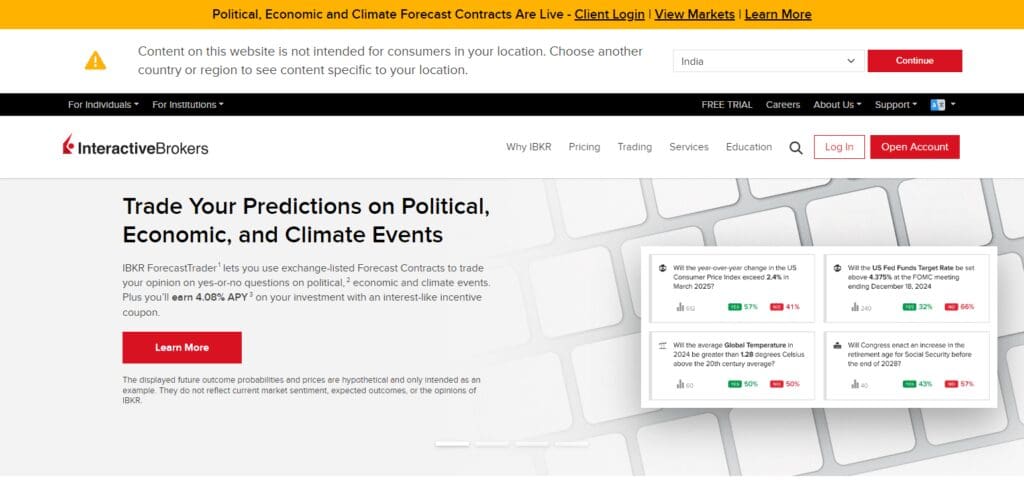
The Company provides a fully integrated market with access to many APIs and different trading algorithms.
As a former skilled trader, Interactive Brokers is highly ranked because of its low fees, highly reliable platform, and great flexibility, which makes it one of the best options for people who want to automate their trading strategies efficiently.
Pros & Cons Interactive Brokers
Pros:
- Low margin rates while offering high leverages.
- Strong throughout the globe.
- Professional traders are presented with advanced tools to trade them professionally.
Cons:
- Can be a bit overwhelming for a novice.
- There are some accounts that are dormant, and they get charged inactive fees.
- Lack of education plan.
2.TradeStation
TradeStation remains one of the top platforms for algorithmic trading, boasting an exceptional set of automation solutions.
Its robust strategy options, customizable algorithms, and intuitive user interface speak volumes for themselves.
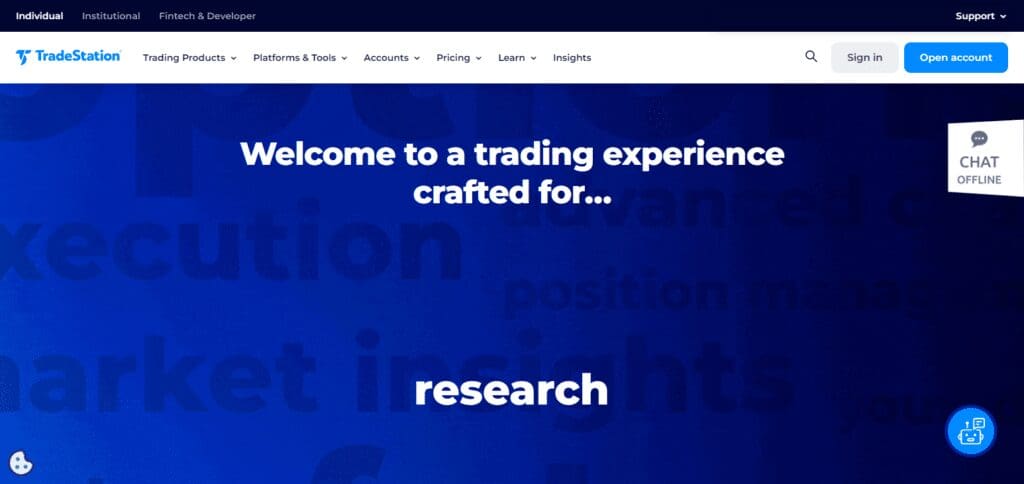
TradeStation offers numerous markets and low cost per trade, making it more competitive.
Great for traders who wish to automate their strategies or are looking to expand their options in the market – people with prior experience and those with none.
The trading performance is further improved with the available powerful backtesting and research tools.
Pros & Cons TradeStation
Pros:
- Strong Charting capacities.
- Besides equities trading, options trading is also available.
- There are strategies within the market that are automated and also are customizable.
Cons:
- Traders that perform lower volumes are charged high monthly fees.
- International market access is limited.
- The structure of the fee is complex.
3.MetaTrader 5
MetaTrader 5 (MT5) is widely regarded as a favorite in algorithmic trading owing to its robust system for strategy automation.
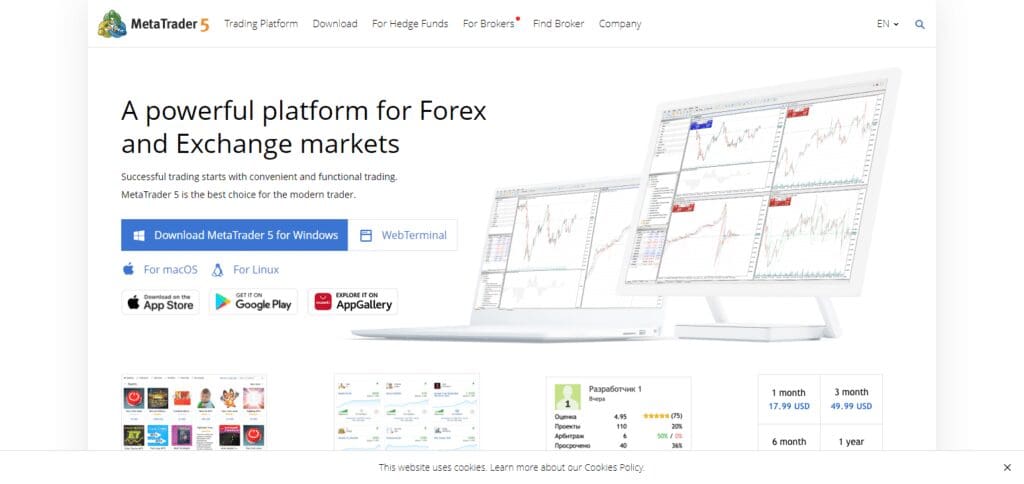
The platform also contains advanced charting tools, backtesting capabilities, and the integration of Expert Advisors (EAs), allowing traders to automate their strategies.
Furthermore, MT5 has a beginner-friendly interface, supports multiple assets, and provides low latency, making it ideal for retail and institutional algorithmic trading.
Pros & Cons MetaTrader 5
Pros:
- Combined trading in forex and stock market (two in one).
- There are better technical tools and analysis indicators.
- The number of trading bots that automate the trading process is large.
Cons:
- It is a bit hard for the rookie traders and investors.
- In comparison to the mobile versions, the desktop has more features.
- Customer support is not optimal.
4. OANDA
OANDA has been rated as one of best brokers in algorithm trading as it has a user friendly interface with adequate automation capabilities.
The broker enables algorithmic strategies, implying third-party applications can be easily interfaced through its API.

Considering low spreads, high execution speed, and availability of multiple markets, OANDA creates an optimal condition for automation of strategies.
Its cutting-edge charting and backtesting tools ensure that traders can achieve consistently reliable and results-driven performance.
Pros & Cons OANDA
Pros:
- There is no minimum deposit that is required.
- There are amazing resources and education tools.
- The platform for trading can be tailored to individual needs perfectly.
Cons:
- There is access to relatively few advanced tools of trading.
- During volatile conditions, better tools have slower speeds of execution.
- Certain pairs of currency have high spreads.
5. Cryptohopper
Cryptohopper is one of the best algorithmic traders in the virtual currency market. Its interface is easy to use as it facilitates the automation of trading strategies, backtesting, paper trading and the creation of strategies.
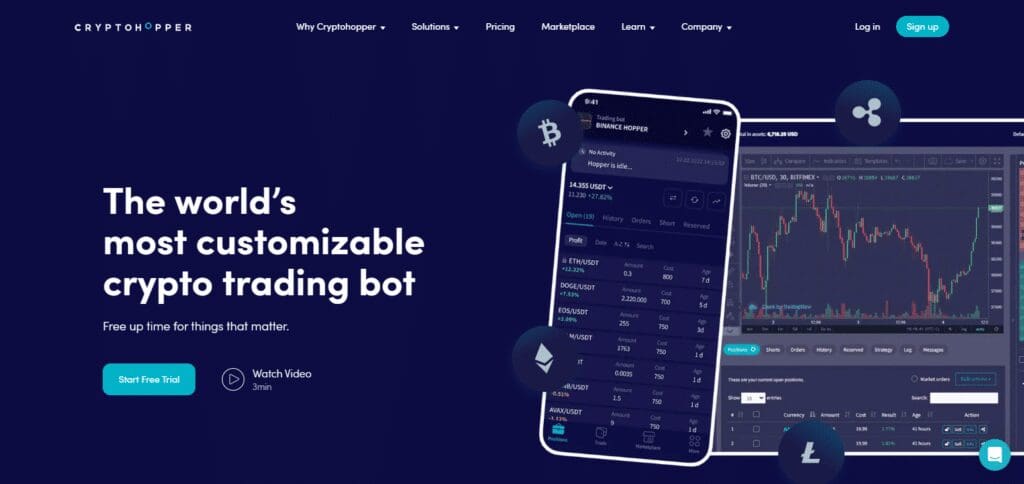
Considering that it supports many exchanges, bots that can be modified, and comprehensive risk management tools, Cryptohopper greatly streamlines the automation of crypto strategies.
This characteristic is further enhanced by the constant availability of the platform and the AI insight integrated into the system – a perfect solution for those interested in automated crypto trading.
Pros & Cons Cryptohopper
Pros:
- There are backtesting features that allow for automated strategies.
- Different cryptocurrencies and several exchanges are catered for.
- It is easy to use due to its interface and is also based in the cloud.
Cons:
- Only available in crypto markets.
- Monthly payments can become a significant expense.
- Some features are only available in higher plans.
6.AvaTrade
AvaTrade is one of the most dominant apps in cryptocurrency trading.
It has unique and decided algorithms that yield results. Correlation with the Meta Trader 4 and Meta Trader 5 gives AvaTrade the capability of strategy automation.
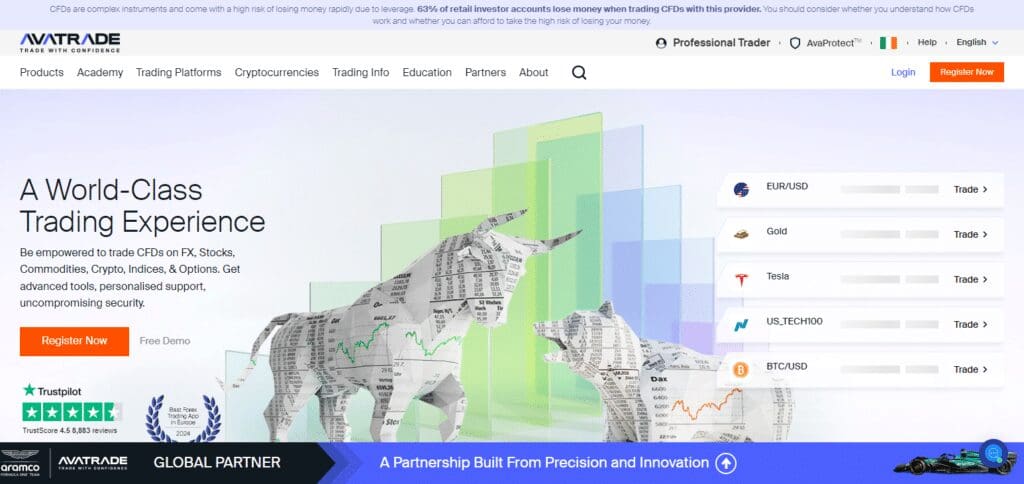
The app has been a favorite due to its low spread, quick execution capacity, and range of support classes.
Algorithmic trading is made easier thanks to the app’s features.
Risk management, strategy optimization, and backtesting features ensure smooth trading automation.
Pros & Cons AvaTrade
Pros:
- It also offers support for forex, stocks, commodities, and crypto.
- The platform is easy to work with, so no prior experience is required.
- Good level of regulation coupled with security.
Cons:
- Spreads on some currency pairings are quite high.
- The tools offered are limited to charting activities for professional traders.
- There is no provision for integrating a crypto wallet.
7. Coinrule
Coinrule is one of the best algorithmic trading platforms for automating cryptocurrency trades.
Its users are able to set up and automate trading plans without ever needing to sit through any detailed coding tutorials.
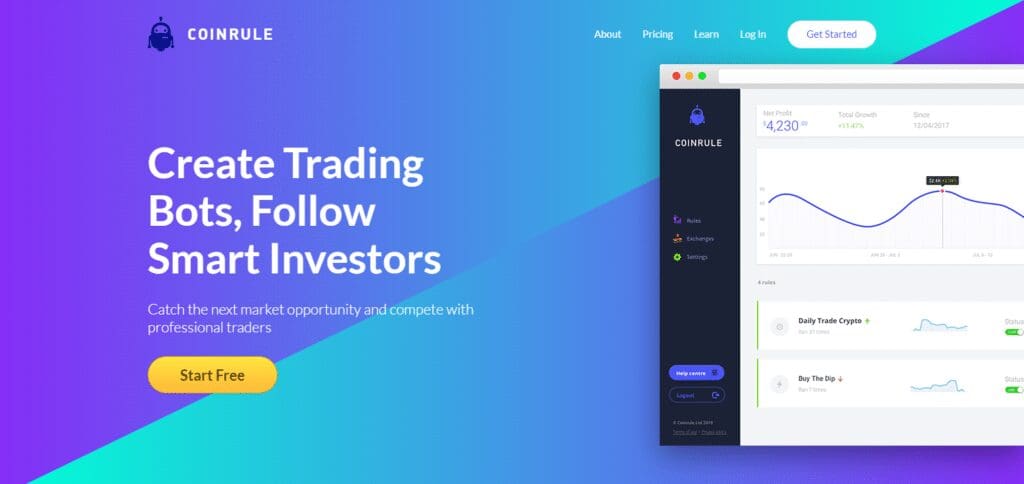
Equipped with backtesting, real-time alerts, and support for different exchanges, the software provides traders with tools to enhance their ability to make optimized trades.
Unlike complex trading tools, Coinrule is simple, offers flexible strategies, and is fortified with risk management systems, enabling beginners to significantly increase their chances of success and advanced users to implement automated strategies without any hassle.
Pros & Cons Coinrule
Pros:
- Automation for the purpose of trading cryptocurrencies is simple.
- Easy creation of rules for customization strategies.
- Backtesting to make sure strategies can be optimized.
Cons:
- Only restricted to the trading of coins.
- Limited options for advanced users.
- No mobile application to manage trades.
8.QuantConnect
QuantConnect is an incredibly sophisticated algorithmic trading platform that excels in tools that focus on automating trading strategies for different assets.
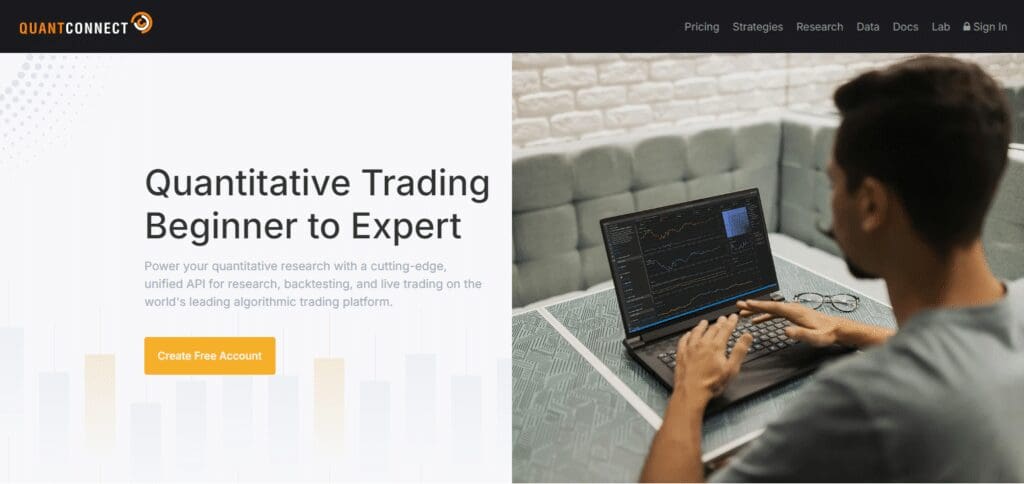
The platform provides integration for Historical Data, Backtesting, and even Machine Learning, allowing traders to craft and deploy complicated algorithms.
QuantConnect outshines the competition in terms of professional traders through its agape source Lean Engine, broker support, and cloud deployment infrastructure, all of which provide the perfect environment for rapid scaling and automating the user’s trading strategies.
Pros & Cons QuantConnect
Pros:
- Acting as an open-source platform for algorithmic trading.
- There are multiple classes of assets supported alongside many data sources.
- Backtesting together with live trading features that are robust in nature.
Cons:
- It’s not easy to set up for users that are not technically knowledgeable.
- Support offered within the community to newcomers is minimal.
- The algorithms that need to be developed have a rather long learning curve.
9.eToro
eToro enables crypto copy trading; it is one of the best platforms for automating trading strategies for users thanks to features such as CopyPortfolios and CopyTrading.

Here, users can automatically put their strategies into action by either creating their own portfolios or copying the trades made by the best investors.
eToro provides access to world markets, has a variety of convenient user features, and offers social trading, which once again proves to be one of the best platforms for both new and experienced traders in optimizing and automating trading strategies in the most effective way.
Pros & Cons eToro
Pros:
- With social trading, you can copy the investments of top users.
- The platform is friendly and comes with an app to rely on.
- There are many assets to choose from, including crypto.
Cons:
- When trading in forex, there are high spreads.
- For traders with an advanced level, the analytical tools offered are basic.
- Withdrawal of funds has a fee.
10.ZuluTrade
ZuluTrade is one of the foremost companies that provides the automation of trading strategies using social trading tools, copy trading tools, or a mix of them.
This company enables its clients to mirror the trades of their professional traders or have their own algorithms built for them, allowing the users to trade in auto mode.
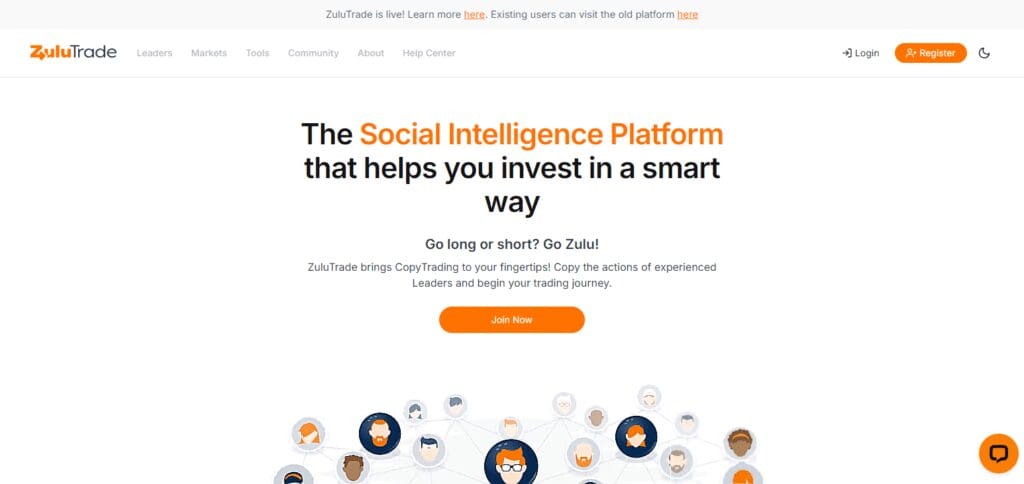
ZuluTrade equips its users with tools for managing risk, performance monitoring, support for several brokers, and features for automating strategies.
This platform allows people to implement strategies on a user-friendly interface and simultaneously gives a wide spectrum of various trading possibilities, which greatly suits those who are interested in intelligently automating one’s trading strategies.
Pros & Cons ZuluTrade
Pros:
- Facilitates trading through signal providers.
- Impressive loss prevention features for traders.
- Flexibility in choosing from different brokers.
Cons:
- At times, there is minimal control over the strategies of signal providers.
- Premium signal providers tend to be slightly expensive.
- Dependence on other parties in some aspects.
How To Choose Best Algorithmic Trading Platforms & Brokers To Automate Your Strategies
Market Access: Select a broker that allows you access to various markets such as stocks, forex, and crypto.
API & Integration: Platforms that integrate well with popular trading software and provide API accessibility are a great choice.
Backtesting Features: Platforms that offer the facility to test out the strategy before executing it live are also ideal.
Execution Speed: Since algorithmic trading has all orders pre-defined, picking a low-latency broker ensures your orders are executed immediately when the parameters are met.
Customizability: It’s crucial to pick a platform that has the ability to create customized algorithms and strategies.
Risk Management Tools: There are several platforms that offer built-in risk management features such as stop-loss and take profit orders, this is something to look out for.
Cost & Fees: Some automated strategies can take a toll on your trade profits due to transaction fees, commissions, and spreads, so be mindful of that.
Reliability & Security: Look for strong infrastructure to prevent a system failure in the first place.
User Support: Automated strategies can lead to various technical issues, so ensure customer support is easily reachable.
Education & Resources: Trading can be improved by using platforms with educational resources and a community where strategies can be developed and optimized.
Conclusion
To sum up, it can be said that a thorough algorithmic trading development and broker research would optimize and automate your trading strategies even further.
With attention to details such as market access, speed of execution, backtesting options, and customizing capabilities, you are not likely to make a mismatched choice.
In addition, factoring in fees, risk management, security, and user support would aid you in making a decision.
Proper automated trading can improve the overall efficiency, accuracy, and profitability of the automated trading system.









